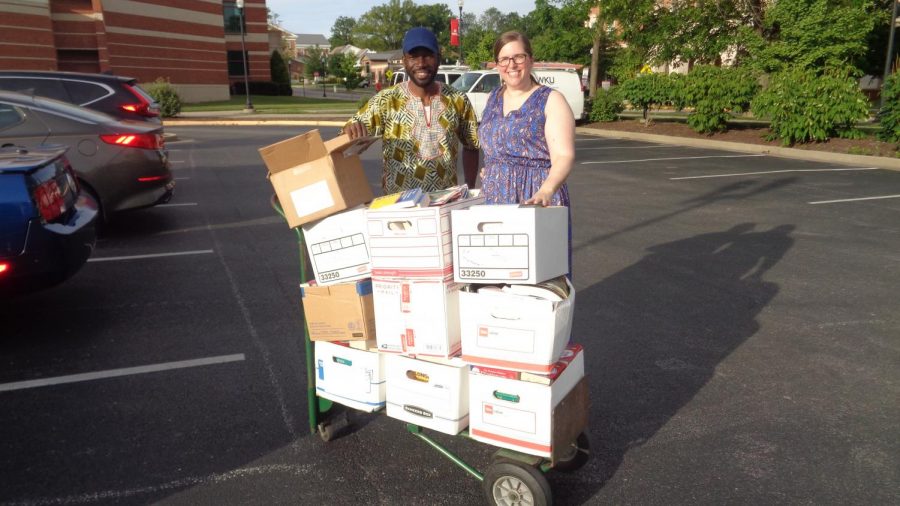Volunteer eagles: collecting books for a better future
African Cultures Club hosts book drive to provide educational resources in Africa
Photo courtesy of Ibrahima Yaro
Ibrahima Yaro, a public administration graduate student and Dawn Winters, a director of academics for English as a Second Language and part-time English faculty at Western Kentucky University, collect books for the drive.
Every other week the Shield will interview a student involved in volunteer work. This week, Jean-Marie Uwimana and Ibrahima Yaro talk about their involvement in the African Cultures Club book drive.
Jean-Marie Uwimana said he always wanted to read, but there were never enough books in the Zimbabwe refugee camp he grew up in.
His high school only had physics and math textbooks, and even those were limited.
“My reading wasn’t great because I’d been reading only numbers and theories,” the senior mathematics, economics, and computer science major said. “Nothing like a nice book to just train your brain to read faster or to write essays better.”
The books Uwimana was able to read were donations and they made a big difference in his life.
Uwimana, now a member of the African Cultures Club, said he and other students in the group wanted to work on a project relating to the social and economic differences in Africa. The group discussed ways to solve this need for educational resources and decided to start a book drive.
The club has successfully collected over 2,000 books since the book drive began last semester. This number was reached with donations from individuals from the university and the community.
The group also reached out beyond the university community. Michigan State University donated 600 books, Sullivan University collected 500 books and Western Kentucky University donated 400 Webster’s Dictionaries.
Ibrahima Yaro, the African Culture Club’s social coordinator and public administration graduate student, said the group still has a long way to go.
He said the group has set a goal of collecting 10,000 books before shipping them to Africa. The group hopes to reach their collection goal by the end of next semester by spreading the word about the book drive to the university’s students and organizations.
Yaro said textbooks for high school and university education levels are needed, along with any other books sitting on people’s shelves they no longer want, because “these books can be useful to someone in Africa.”
Yaro said, having lived in West Africa, he understands the reality of the educational system for students and hopes that by collecting books, it will help provide both students and teachers with the basic materials they lack.
Uwimana said these donated books can change students’ lives and are the key to their futures.
“Education was my path to getting out the (refugee) camp,” he said. “It was my opportunity to get the life I’d always dreamt of.”
Uwimana said keeping books from students not only affects their education but also limits their imagination, creativity and problem-solving. Students are only reading the few books focusing on traditional educational careers of doctors or lawyers in African countries, and are not exposed to non-traditional career options like writing, art or journalism.
“You can train your mind to be more creative when you read wider,” he said. “When you bring together different ideas, that’s when you come up with something amazing.”
Uwimana said he knows these books will change lives because they changed his.
His passion for education led him to the university and now he is working to teach other African students about the endless possibilities for their futures.
“I know from personal experience that it is going to be very helpful,” he said. “Somebody gave me something they didn’t need or didn’t necessarily use. For me, it meant the world because it was useful and it changed my life.”



